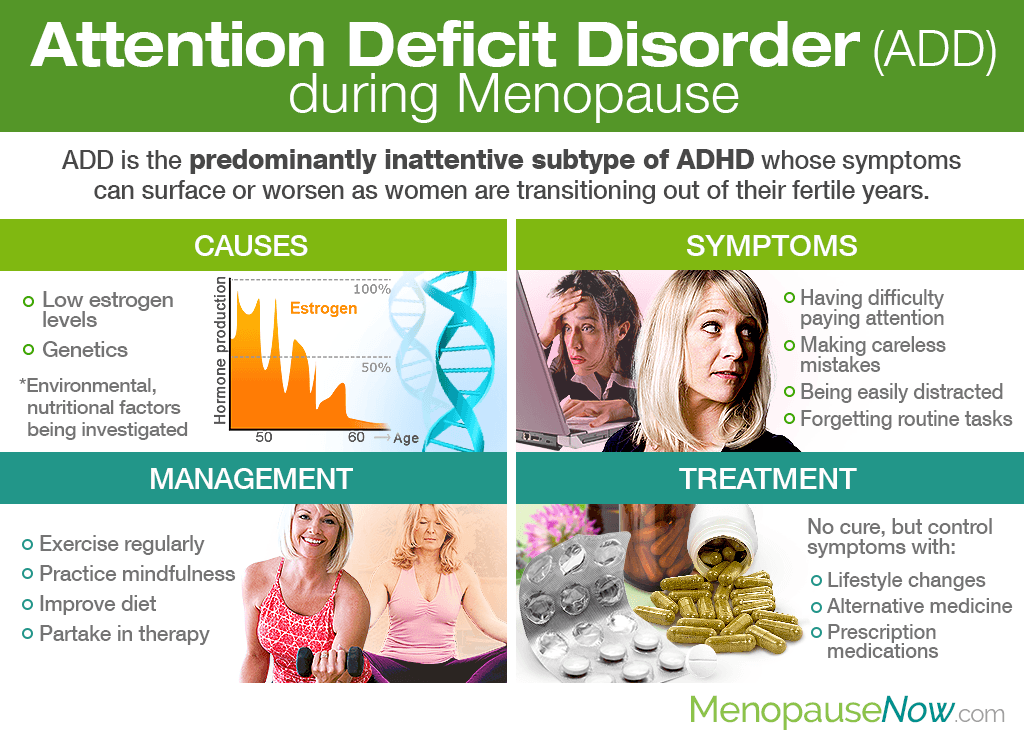Difficulty concentrating, memory lapses, and other cognitive issues are just a few of the many hormonal imbalance symptoms that can surface throughout the menopausal transition. Unfortunately, women who suffer from attention deficit disorder are also in for a surprise.
Find out all you need to know about attention deficit disorder during menopause below, including its causes, management, treatment, and more for optimal cognitive functioning into your twilight years.
Difference between ADD and ADHD
Attention deficit disorder (ADD) and attention deficit hyperactivity disorder (ADHD) have only recently been identified as the same condition.
Nevertheless, many professionals still consider them separate, categorizing ADD as one of the three subtypes of ADHD: predominantly inattentive, predominantly hyperactive, or combined.
ADD is referenced as the subtype of ADHD that is predominantly inattentive, while ADHD is that which is predominantly hyperactive.
It is not uncommon for a woman to present any three of these subtypes - predominantly inattentive, predominantly hyperactive, or a combination of the two - at different points in her lifetime.
Causes of ADD during Menopause

Research has found that those who suffer from ADHD have lower levels of dopamine and other neurotransmitters.
This is especially important for menopausal women as estrogen levels have a positive correlation with dopamine levels. Consequently, as estrogen levels drop, so do those of dopamine, and vice versa.
As such, it can be said that the appearance - but mainly exacerbation - of ADD during perimenopause is principally attributed to the drastic hormonal fluctuations taking place in women's bodies as their ovaries end reproductive functions.
There also appears to be a genetic basis for ADD, and researchers are trying to uncover a possible link between adult ADD and nutritional or environmental factors. Conclusive results are yet to be found.
Symptoms of ADD during Menopause

There are over ten symptoms of ADD / ADHD in adults, nine of them being associated with inattention problems. To be diagnosed with ADD, a woman has to exhibit at least six out of the nine symptoms associated with the predominantly inattentive form of ADHD. These are:
- Having difficulty sustaining attention
- Making careless mistakes
- Having problems with organization
- Being easily distracted
- Frequently failing to complete work
- Forgetting routine chores
- Putting off or avoids tasks requiring sustained attention
- Losing materials needed for task completion
- Appearing not to be listening when spoken to
Also, it is not uncommon for women who have ADD to suffer from other psychological conditions, such as depression and anxiety, both of which are common during the menopausal transition as well.
Management of ADD

There are certain initiatives women of all ages can take in order to manage their symptoms of attention deficit disorder, including:
Exercising regularly. Exercise will help improve cognitive functions, sleep patterns, mood, and self-esteem, all of which can be affected during perimenopause.
Practicing mindfulness. Mindfulness teaches women to pay attention to the present moment and what is currently happening around you, preventing the mind from being distracted.
Improving diet. Consume a healthful diet rich in micronutrients - specifically zinc, iron, magnesium, and vitamin B6 - and omega-3 fatty acids while reducing exposure to artificial colors and additives.
Partaking in therapy. Various approaches, like group therapy or cognitive behavioral therapy, create and implement effective strategies for behavior modification.
Boosting cognition. Playing memory games, reading books, or doing puzzles can be beneficial for improving concentration and cognitive functions.
Hiring a coach. Coaches can offer women suffering from ADD during menopause practical solutions, recommendations, and feedback in order to help them reach their goals.
Treatment of ADD during Menopause

While there is no known cure for ADD, a combination of approaches to control the exacerbation of symptoms often yields the best results in the long run.
For menopausal women, this means getting the disorder under control long-term by tackling the hormonal imbalance at play.
Natural and effective treatments for difficulty concentrating focus on the implementation of less risky lifestyle changes. Women should strive to make aforementioned diet and exercise adjustments alongside addiction control - smoking and alcohol - as good starting points.
Also, menopausal women are encouraged to pursue alternative medicine options of phytoestrogenic herbal supplements or hormone-regulating supplements, both of which offer unique properties for ultimate endocrine system health.
Lastly, depending on a woman's specific case and the severity of the ADD, her doctor may recommend prescription medications. The major choices are psychostimulants, antidepressants, or nonstimulant drugs, all of which impact neurotransmitters that send signals to brain cells.
Key Takeaways
In sum, ADD is the predominantly inattentive subtype of ADHD. It is not uncommon for menopausal women who suffer from ADD to have exacerbated symptoms as decreased estrogen levels further decrease already low dopamine levels. While there are a variety of management techniques that can bring menopausal women relief, such as regular exercise, mindfulness, and therapy, pursuing treatments that focus on hormonal balance with a combination of lifestyle changes and alternative medicine may reap the best results long-term. Nevertheless, speak with your doctor about which approach is best for you.
Sources
- CHADD. (2016). Q&A: ADD vs. ADHD. What's the Difference? | Changing Estrogen Levels Affect Women's ADHD Symptoms—Part Three. Retrieved August 13, 2019, from https://chadd.org/adhd-weekly/qa-add-vs-adhd-whats-the-difference/ | https://chadd.org/adhd-weekly/changing-estrogen-levels-affect-womens-adhd-symptoms-part-three/
- Cleveland Clinic. (2013). Attention Deficit Disorder Without Hyperactivity (ADD) in Adults: Overview | Management and Treatment. Retrieved August 13, 2019, from https://my.clevelandclinic.org/health/diseases/15253-attention-deficit-disorder-without-hyperactivity-add-in-adults | https://my.clevelandclinic.org/health/diseases/15253-attention-deficit-disorder-without-hyperactivity-add-in-adults/management-and-treatment
- Epperson, C.N. et al. (2015). New onset executive function difficulties at menopause: a possible role for lisdexamfetamine. Psychopharmacology (Berl), 232(16), 3091-3100. doi: 10.1007/s00213-015-3953-7
- Harvard Health Publishing. (2006). Diet and attention deficit hyperactivity disorder. Retrieved August 13, 2019, from https://www.health.harvard.edu/newsletter_article/Diet-and-attention-deficit-hyperactivity-disorder
- Griffin, R. (n.d.). What's the Difference Between ADD and ADHD? Retrieved August 13, 2019, from https://www.understood.org/en/learning-attention-issues/child-learning-disabilities/add-adhd/difference-between-add-adhd
- Osland, S. et al. (2017). Smoking, alcohol and drug use in youth and adults with attention-deficit hyperactivity disorder. BJPsych Open, 3(3), 141-146. doi: 10.1192/bjpo.bp.116.004317

